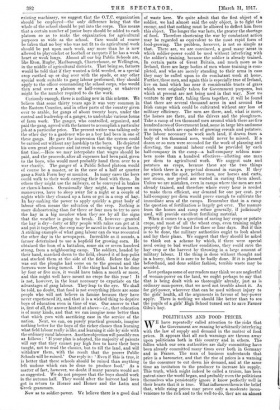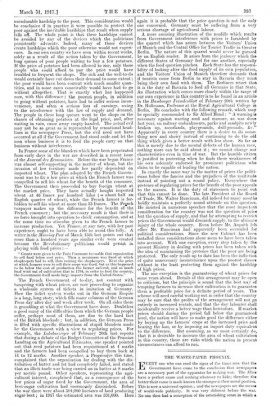POLITICIANS AND FOOD PRICES.
WE have repeatedly called attention to the risks that the Government are running by arbitrarily interfering with the law of supply and demand in the matter of food prices. It appears that all such warnings are thrown away upon politicians both in this country and in others. The follies which our own authorities are daily committing have been already committed many times over both in Germany and in France. The man of business understands that price is a barometer, and that the rise of prices is a warning to the consumer to cut down his demand, and at the same time an invitation to the producer to increase his supply. This truth, which might indeed be called a truism, has been patent since the world began, and probably even the politicians themselves who persistently ignore it know perfectly well in their hearts that it is true. What influences them is the belief that, while rising prices may prove only a moderate incon- venience to the rich and to the well-to:do, they are an almost unendurable hardship to the poor. This consideration would be conclusive if in practice it were possible to protect the poor against the inevitable hardships that result when supply falls off. The whole point is that these hardships cannot be avoided by any of the devices which the politicians persistently advocate. Indeed, many of those devices create hardships which the poor otherwise would not experi- ence. In our own country we have seen within recent weeks, solely as a result of the action taken by the Government, long queues of poor people waiting to buy a few potatoes. If the price of potatoes had been allowed to rise, only those people who could afford to pay the price would have troubled to frequent the shops. The rich and the well-to-do would certainly have cut down their demand to some extent ; the poor would have been content with much smaller quan- tities, and in some cases conceivably would have had to go without altogether. That is exactly what has happened now, with this difference : the poorest people, in addition to going without potatoes, have had to suffer serious incon- venience, and often a serious loss of earnings, owing to the interference with the law of supply and demand. Tho people in these long queues went to the shops on the chance of obtaining potatoes at the legal price, and, after waiting in vain, came away empty-handed. The actual evil may not be as great as is represented by sensational head- lines in the newspaper Press, but the evil need not have occurred at all if the Government had stood aside and let the men whose business it is to feed the people carry on that business without interference.
In France some of the blunders which have been perpetrated from early days in the war are described in a recent issue of the Journal des Economistes. Before the war began France was almost self-supporting in the matter of wheat, but the invasion of her territory made her partly dependent on imported wheat. The plan adopted by the French Govern- ment was to fix a low price at which the French farmer was compelled to sell his wheat for the benefit of the consumer. The Government then proceeded to buy foreign wheat at the Market price. They have actually bought imported wheat at 46 francs per hundred kilos ( = about half an English quarter of wheat), while the French farmer is for- bidden to sell his wheat at more than 33 francs. Tho Frwich taxpayer makes up the difference for the benefit of the French consumer ; but the necessary result is that there is no force brought into operation to check consumption, and at the same time no stimulus given to the French farmer to increase production. Yet France, at any rate, with her past experience, ought to have been able to avoid this folly. A writer in the Morning Post of March 13th last points out that more than a hundred 3-ears ago similar evils were created because the Revolutionary politicians would persist in playing with food prices :— " Grants were given to the Paris Commune to enable that organization to sell food below cost prim Then a maximum was fixed at which shopkeepers had to sell, thus ruining the shopkeepers. Next the price at which farmers were to sell their crops was fixed, but as this happened to be below the cost of production tho farmer suffered, and so much land went out of cultivation that in 1794, in order to feed the country, the Government itself made large imports from the United States."
. The French Government of to-day, not content with tampering with wheat prices, are now proceeding to organize a wholesale system of tickets in imitation of Germany. How the ticket system works out in the German Empire is a long, long story, which fills many columns of the German Press day after day and week after week. On all sides there is grumbling at what the Government have done. Doubtless a good many of the difficulties from which the German people suffer, perhaps most of them, are due to the hard fact of the British blockade ; but, in addition, the German Press is filled with specific illustrations of stupid blunders made by the Government with a view to regulating prices. For example, the Lokalaireiger of February 20th last reports that during a debate of the Budget Committee of the Prussian Landtag on the Agricultural Estimates, one speaker pointed out that seed potatoes had been requisitioned at 4 marks and the farmers had been compelled to buy them back at 11 to 12 marks. Another speaker, a Progressive this time, complained that the organization for dealing with the dis- tribution of butter and fat had completely failed, and stated that an illicit trade was being carried on in butter at 8 marks per metric pound. Other speakers, representing the agri- cultural interest, complained that, as a consequence of the low prices of sugar fixed by the Government, the area of lieet-sugar cultivation had enormously diMinished. Before the war there were about 504,000 hectares of land producing sugar-beet ; in 1917 the estimated area was 331,000. Here again it is probable that the price question is not the only one concerned. Germany must be suffering from a very serious shortage of agricultural labour.
A more amusing illustration of the muddle which results from Government interference with prices is furnished by the quarrel which has arisen between the Visitors' Union of Munich and the Central Office for Tourist Traffic in Greater Berlin. The nature of this quarrel would never be guessed by an English reader. It arises from the jealousy which the different States of Germany feel for one another, especially when the food question pinches. Each State has the responsi- bility of looking after the food supply of its own population, and the Visitors' Union of Munich therefore demands that if tourists come from Berlin to stay in Bavaria they must bring their own food with them. The Berliners retort that it is the duty of Bavaria to feed all Germans in that State. An illustration which comes more closely within the range of
our own experience in this country is to be found in an article in the Hamburger Fremdcnblalt of February 20th written by Dr. Hollmann, Professor at the Royal Agricultural College in Berlin. He concludes with the following remark, which may be specially commended to Sir Alfred Mond : A warning is necessary against wasting seed and manure, as was done last year, on railway embankments, parks and sandpits newly broken up, moorlands, playgrounds, drill-grounds, &c.
Apparently in every country there is a desire to do some- thing new and showy instead of continuing to do the old thing which gives a better result with less show. So far as this is merely due to the mental defects of the human race, nothing more can be said about it ; we cannot change our characteristics even in time of war. But the humble citizen is justified in protesting when he finds these weaknesses of his own solemnly endorsed by prominent politicians who claim to be capable of leading the nation.
In exactly the same way in the matter of prices the politi- cians follow the fancies and the prejudices of the multitude instead of pointing out a sound policy. Everywhere the pretence of regulating prices for the benefit of the poor appeals to the masses. It is the duty of statesmen to point out that this cannot be done. The late President of the Board of Trade, Mr. Walter Runciman, did indeed for many months boldly maintain a perfectly sound attitude on this question.
He insisted in numerous speeches that the most impoit int consideration for the country was not the question of price but the question of supply, and that by attempting to restrict prices the Government would diminish supply, to the ultimate injury of the whole country. Even before Mr. Asquith left office Mr. Runciman had apparently been overruled for political considerations. Since the new Cabinet has been installed these considerations alone seem to have been taken into account. With one exception, every step taken by the present Ministry in dealing with prices has been taken with the idea of maintaining the pretence that the poor are being protected. The only result up to date has been the infliction of quite unnecessary inconvenience upon the poorest classes without in the least protecting them against the hardship of high prices.
The one exception is the guaranteeing of wheat prices for some years ahead. Details of this arrangement may be open to criticism, but the principle is sound that the best way of tempting farmers to increase their cultivation is to guarantee them a profitable price for a definite period of years. The scheme will need careful working out in order that the country may be sure that the profits of the arrangement will not go entirely in increased rentals, and that the day labourer shall incidentally receive a better wage than heretofore. If market prices should during the period fall below the guaranteed level, the nation will have to make good the difference either by buying up the farmers' crops at the increased price and bearing° the loss, or by imposing an import duty equivalent to the difference. But assuming, as we most certainly do, that it is desirable to increase the area of wheat cultivation in this country, these are risks which the nation in present circumstances can afford to run.



























 Previous page
Previous page